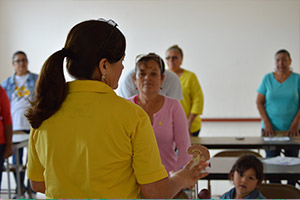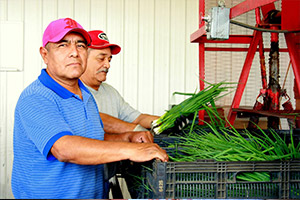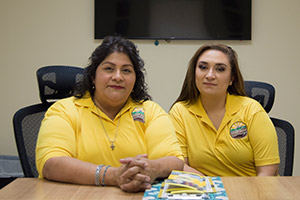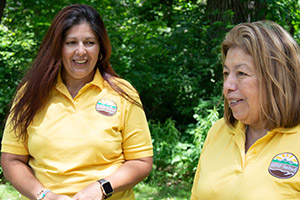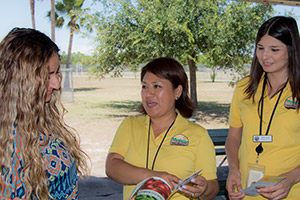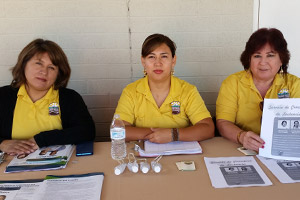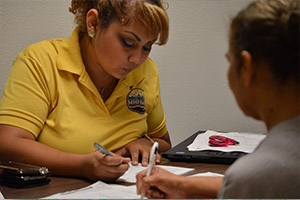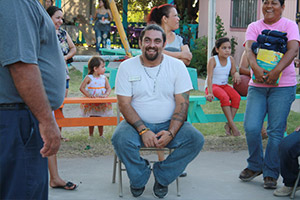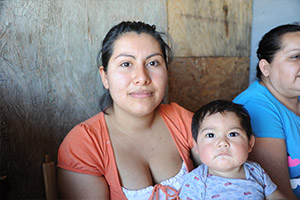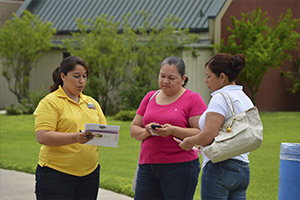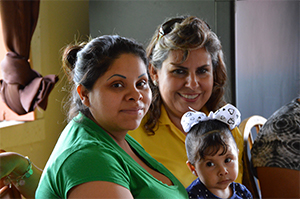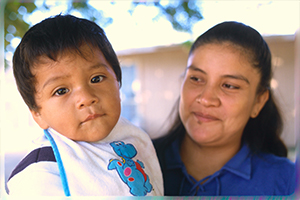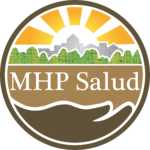Our Community Health Worker Programs
Over the course of our thirty-five year history, we have successfully implemented
CHW porgrams to address countless health and social topics in communities across America.
Community Health Workers and Chronic Disease
Over the years, MHP Salud has developed multiple Community Health Worker (CHW) programs that address a variety of chronic diseases. MHP Salud’s programs have impacted many health behaviors that influence chronic disease outcomes, like healthy eating, physical activity, and timely disease screening.
MHP Salud’s programs are based on high-quality evidence1 that Community Health Workers improve chronic disease outcomes. In particular, research has demonstrated CHWs can positively influence hypertension, heart disease, diabetes, cancer, and asthma.2,3,4,5,6,7 CHWs are particularly effective at addressing chronic disease because they come from the communities they serve. This quality puts CHWs in the best position to provide health education that is well-versed in the culture and language of the people being served, which empowers community members to practice impactful health behaviors.
Community Health Worker programs also yield financial benefits, as improving chronic disease outcomes can produce positive cost-savings. MHP Salud has found positive return-on-investment (ROI) of $1.09-3.16 for every $1 invested in its CHW-led programs. Positive cost savings have also been established by other CHW-led programs for numerous chronic diseases in a variety of settings.8,9This has enormous implications, considering that the treatment of chronic disease in the United States makes up approximately 86% of all national healthcare spending.10
Community Health Worker programs that focus on chronic disease have also generated positive outcomes for participants. Participants in Salud y Vida, a program that focused on improving diabetes management among individuals with uncontrolled type 2 diabetes experienced statistically significant improvements regarding their fruit and vegetable intake, weight, and hemoglobin a1c levels over the course of the program.
MHP Salud Programs That Have Followed This Model:
CHWs Supporting Healthy Relationships
MHP Salud has implemented numerous Community Health Worker (CHW) programs that address the challenges experienced by survivors of sexual and/or intimate partner violence (IPV) and stalking. While each of MHP Salud’s healthy relationships programs are tailored to meet the needs of the local community, many follow the same successful model. Key activities include community outreach to provide information and combat stigma; community-based support groups with an arts-therapy component to provide social support and healing; and the identification and training of community leaders to educate within the community and continue support groups once the program ends.
There are profound implications for these programs, as an estimated 1 in 3 women have been impacted by sexual violence, 1 in 4 have been affected by IPV, and 1 in 6 have experienced stalking.11 Survivorship is associated with mental and physical health challenges that can profoundly impact an individual’s quality of life, especially if left unaddressed.12 Community Health Workers are well-situated to address these challenges by providing social support, culturally and linguistically tailored care, and by impacting community norms on healthy relationships through outreach and education.
Community Health Worker programs that target survivors of domestic abuse or IPV can generate positive outcomes for participants as well. Voces Unidas (United Voices) used Community Health Workers (CHWs) and peer support leaders to provide outreach and support for sexual assault survivors in Willacy and Cameron Counties in Texas. CHWs also provided information and education, formed community-based support groups, and referred women to community-based individual or group counseling sessions where appropriate. Over the course of the program, participants reported improvements in knowledge, self-esteem, depression, and stress.
MHP Salud Programs That Have Followed This Model:
CHWs and Community Assistance & Support
Throughout the organization’s history, MHP Salud has created several Community Health Worker-led programs that address the most pressing health concerns within communities. These responsive programs have covered a wide range of health topics that are determined based on the specific needs of the communities served. MHP Salud has used Community Health Worker- led programs to address health challenges like mental health, application assistance and elder health. Programs that improve community health can also have a strong financial impact. MHP Salud has determined a return on investment (ROI) of $2.19-3.09 for every $1 invested in its healthy community programs. This cost-savings demonstrates the adaptability of the CHW-model to address a variety of health challenges in communities, while also having a positive economic impact.
Community Health Workers are well equipped to address emerging health challenges within their communities. They reach individuals “where they are” in terms of cultural preferences, language, and geographic location. Community Health Workers can provide insight into the common barriers to care and helpful resources that are available to affected individuals. MHP Salud’s Community Health Workers have improved the health of communities by increasing enrollment in public assistance and health insurance programs, supporting elders aging in place and by educating community members on mental health issues.
Community Health Workers also make particularly effective insurance navigators. From 2013 – 2015 MHP Salud’s Navigator program employed Community Health Workers to provide education and application assistance and help community members navigate the insurance marketplace. Over the course of the program, the CHW navigators assisted over 1,500 individuals and families in applying for enrollment. Over 6,000 individuals were reached through either one-on-one Navigator appointments or consumer encounters at a health fair. The program was particularly successful in reaching low income, Spanish-speaking families, as 83% of participants spoke Spanish as a primary language and over 60% of participants had a household income of under $20,000 a year.
MHP Salud Programs That Have Followed This Model:
Community Health Worker Training and Consulting
Also known as the Capacity Building Assistance Program (CBA)
For over 20 years, the Capacity Building Assistance (CBA) Program has been helping Federally Qualified Health Centers and other healthcare organizations across the country create their own Community Health Worker programs. MHP Salud’s CBA Program provides education, training and technical assistance to these organizations to successfully plan, implement and evaluate their own Community Health Worker programs, or to improve upon their existing programs. Implementing the Community Health Worker model enables organizations to better support their communities in a culturally and linguistically appropriate way; it provides an effective way to increase both the reach and quality of healthcare services.
The CBA Program has developed and strengthened partnerships across the country, including the National Association of Community Health Centers, the Farmworkers Health Network, and the National Cooperative Agreement Advisory Group, among others.
In 2018, we spent a total of 632 hours providing technical assistance to other organizations.
227 hours promoting health equity, 156 hours increasing access to care, 137 hours improving health outcomes for A1c levels and 113 hours improving health outcomes for hypertension.
The CBA program also provided trainings that covered topics such as CHW foundations, CHW supervision, CHW return on investment and more. They were provided in-person or virtually through our newly developed interactive virtual classroom. MHP Salud conducts an in-depth analysis of the trainings to verify that participants are leaving the classroom equipped with more knowledge about CHWs and CHW programs. Post-tests are provided to participants at the conclusion of the trainings to access this. Last year’s participants reported increased knowledge in areas such as the role and worth of Community Health Workers, CHWs and hypertension and diabetes, the impact of culture on health, health literacy and more.
The CBA program completed 10 publications on CHWs and the CHW model that covered topics such as CHWs & Diabetes Interventions, CHWs and Hypertension and two newsletters (La Esperanza and Promotora News) that focus on all things CHW and the CHW profession.
Building the capacity of other organizations to deliver Community Health Worker programs for their unique populations, and collaborating with partners across the country furthers the success of the Community Health Worker model as a sustainable, culturally-appropriate means to improve health.
CHW Programs That Target Sexual and Reproductive Health
Over the course of the organization’s history, MHP Salud has developed several Community Health Worker programs that focus on sexual and reproductive health, with many programs focusing specifically on maternal child health. Because of their cultural and linguistic connection to the people they support, CHWs are particularly effective at providing education and support about maternal health and care for children of all ages to community members. This is corroborated by research that indicates maternal health programs that utilize CHWs have positive outcomes for mothers and children. (13,14) CHWs also make effective doulas and are well-equipped to provide expecting mothers and families with emotional support, guidance, and education. As stress, anxiety, and depression in pregnancy are risk factors for adverse health outcomes(15), the value of these services cannot be understated.
MHP Salud’s maternal child health programs also yield promising results. Amor Maternal, a program that utilized CHWs as doulas, illustrated positive health outcomes for newborns. Of the 154 births occurred during the duration of the program, only 4.6% of the newborns were transferred to the neonatal intensive care unit, well below the national average. (15)
Amor Maternal also yielded positive outcomes by utilizing CHWs as breastfeeding peer counselors in Texas. The program targeted expecting and recent mothers and provided them with education on the importance of breastfeeding. 97% of program participants initiated breastfeeding and continued for at least six weeks, exceeding the national average.(16)
MHP Salud Programs That Have Followed This Model:
About MHP Salud
MHP Salud has over thirty years of experience implementing CHW programs and training organizations looking to start and/or strengthen their own CHW programs. For more information about MHP Salud, our services, and how we can help you, please email us at info@mhpsalud.org


